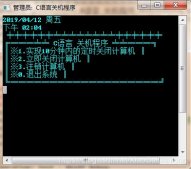一、C语言风格
在C语言中,字符串存储为字符数组,以'\0'结束。
在C的接口中,有strstr函数,可以在字符串中查找另一个字符串。
char * strstr(const char *str1, const char *str2);
功能为在str1中查找str2,如果存在,那么返回查找到的起始指针,否则返回NULL。
参考代码:
|
1
2
3
4
5
6
7
8
9
10
11
12
13
14
15
16
17
18
19
|
#include <iostream>#include <string>#include <cstring>using namespace std;int main(){ string a= "abcdefghigklmn" ; char *b= "def" ; char *c= "123" ; if ( strstr (a.c_str(), b) == NULL) //在a中查找b,如果不存在, cout << "not found\n" ; //输出结果。 else //否则存在。 cout << "found\n" ; //输出结果。 if ( strstr (a.c_str(), c) == NULL) //在a中查找b,如果不存在, cout << "not found\n" ; //输出结果。 else //否则存在。 cout << "found\n" ; //输出结果。 return 0;} |
二、C++风格
C++的string类提供了字符串中查找另一个字符串的函数find。
其重载形式为:
string::size_type string::find(string &);
功能为在string对象中,查找参数string类型的字符串是否存在,如果存在,返回起始位置。
不存在则返回 string::npos。
参考代码如下:
|
1
2
3
4
5
6
7
8
9
10
11
12
13
14
15
16
17
18
19
20
21
|
#include <iostream>#include <string>using namespace std;int main(){ string a= "abcdefghigklmn" ; string b= "def" ; string c= "123" ; string::size_type idx; idx=a.find(b); //在a中查找b. if (idx == string::npos ) //不存在。 cout << "not found\n" ; else //存在。 cout << "found\n" ; idx=a.find(c); //在a中查找c。 if (idx == string::npos ) //不存在。 cout << "not found\n" ; else //存在。 cout << "found\n" ; return 0;} |
两种方法在实际编程中都可以使用,效率几乎相同。
不过相对来说使用C++的string效率更高一些,代码也更简便。
以上就是C++编程判断String字符串是否包含某个字符串实现示例的详细内容,更多关于C++判断String字符串是否包含某个字符串的资料请关注服务器之家其它相关文章!
原文链接:https://blog.csdn.net/weixin_55305220/article/details/118174413
















